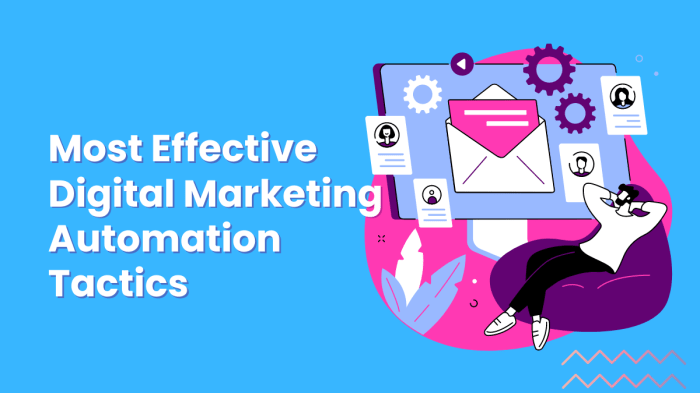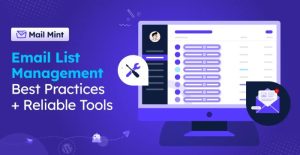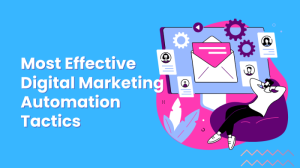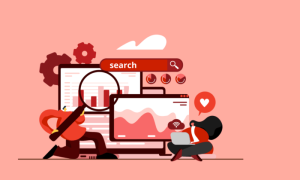
Jump into the world of Digital Marketing Automation where tasks get automated for smoother operations and enhanced efficiency.
From AI to data analytics, this overview covers it all to help you understand the power of automation in digital marketing.
Introduction to Digital Marketing Automation
Digital marketing automation refers to the use of software and technology to streamline, automate, and measure marketing tasks and workflows. This allows businesses to effectively target their audience, nurture leads, and improve overall marketing efficiency.
Benefits of Using Automation in Digital Marketing
- Increased efficiency: Automation allows repetitive tasks to be done automatically, saving time and resources.
- Improved targeting: By analyzing customer data, automation helps in targeting the right audience with personalized content.
- Lead nurturing: Automation tools can help in nurturing leads through personalized emails and content, leading to higher conversion rates.
- Enhanced analytics: Automation provides detailed analytics and insights, helping marketers make data-driven decisions for better results.
Examples of Tasks that can be Automated in Digital Marketing
- Email marketing campaigns: Automated email sequences can be set up based on user behavior and demographics.
- Social media posting: Scheduling posts in advance and analyzing engagement can be automated for better social media management.
- Lead scoring: Automation tools can assign scores to leads based on their interactions with the website, helping prioritize follow-ups.
- Ad campaigns: Setting up automated ad campaigns that adjust based on performance metrics can optimize marketing spend.
Key Components of Digital Marketing Automation
Artificial intelligence, data analytics, and various tools and software play crucial roles in digital marketing automation.
Role of Artificial Intelligence in Marketing Automation
Artificial intelligence (AI) is a key component of digital marketing automation, as it enables businesses to analyze customer behavior, personalize marketing campaigns, and optimize the customer journey. AI algorithms can process large amounts of data quickly and efficiently, allowing marketers to make data-driven decisions and target the right audience with the right message at the right time.
Importance of Data Analytics in Automation
Data analytics is essential for digital marketing automation, as it provides valuable insights into customer behavior, preferences, and trends. By analyzing data from various sources, marketers can create targeted campaigns, measure the effectiveness of their strategies, and make informed decisions to improve overall marketing performance.
Various Tools and Software Used for Digital Marketing Automation
There are numerous tools and software available for digital marketing automation, such as customer relationship management (CRM) systems, email marketing platforms, social media management tools, and marketing automation software. These tools help streamline marketing processes, automate repetitive tasks, and deliver personalized experiences to customers across multiple channels.
Integration with E-Commerce Marketing
Digital marketing automation plays a crucial role in enhancing e-commerce strategies by streamlining processes, increasing efficiency, and improving customer engagement. One of the key areas where automation can make a significant impact is in email marketing for e-commerce businesses. By automating email campaigns, businesses can deliver personalized and targeted messages to customers at the right time, leading to higher conversion rates and increased sales.
Automation of Email Marketing for E-Commerce Businesses
Automating email marketing for e-commerce businesses involves setting up automated workflows that send out targeted emails based on customer behavior, preferences, and interactions with the website. This includes sending welcome emails to new subscribers, abandoned cart reminders to customers who left items in their shopping cart, and product recommendations based on past purchases or browsing history. By automating these processes, businesses can deliver timely and relevant messages to customers, increasing the likelihood of conversions and repeat purchases.
- Automated welcome emails: Greet new subscribers with a personalized welcome email, introducing them to your brand and enticing them to explore your products.
- Abandoned cart reminders: Send automated emails to customers who have items in their cart but did not complete the purchase, reminding them to complete their order and offering incentives to encourage conversion.
- Product recommendations: Utilize automation to send personalized product recommendations to customers based on their past purchases or browsing history, increasing the chances of cross-selling and upselling.
Role of Personalized Recommendations in E-Commerce Automation
Personalized recommendations play a crucial role in e-commerce automation by providing customers with relevant product suggestions tailored to their preferences and interests. By utilizing data analytics and machine learning algorithms, e-commerce businesses can deliver personalized recommendations that increase user engagement, drive conversions, and foster customer loyalty.
- Improved user experience: Personalized recommendations enhance the shopping experience by helping customers discover products that align with their tastes and preferences, leading to increased satisfaction and engagement.
- Increased conversion rates: By showcasing products that are likely to interest the customer, personalized recommendations can drive higher conversion rates and boost sales revenue.
- Enhanced customer loyalty: Tailoring recommendations to individual customers’ needs and preferences fosters a sense of loyalty and connection, encouraging repeat purchases and long-term customer relationships.
Advertising Automation
Automation plays a crucial role in optimizing digital advertising campaigns by streamlining processes, improving efficiency, and enhancing targeting capabilities. Through automation, marketers can reach the right audience with the right message at the right time, leading to better results and higher ROI.
Retargeting and Remarketing
Retargeting and remarketing are essential strategies in digital advertising automation. Retargeting involves targeting users who have previously visited your website but did not convert, while remarketing targets users who have interacted with your brand in some way. By using automation tools to track user behavior and serve personalized ads accordingly, marketers can effectively re-engage with potential customers and drive conversions.
- Automation tools help track user behavior across multiple touchpoints and channels, allowing marketers to segment audiences based on their interactions with the brand.
- By automating the process of serving targeted ads to these segmented audiences, marketers can deliver relevant messages that are more likely to resonate with users, increasing the chances of conversion.
- Automation also enables marketers to set up rules and triggers for when to show specific ads, ensuring that ads are shown at the most opportune moments to maximize impact.
A/B Testing Ads
A/B testing is a crucial component of digital advertising automation, allowing marketers to experiment with different ad creatives, messaging, and targeting strategies to identify the most effective approach. Automation tools simplify the process of running A/B tests by automatically splitting traffic, measuring performance metrics, and providing insights to optimize ad campaigns.
- With automation, marketers can easily create multiple ad variations and set up experiments to test different elements such as headlines, images, calls-to-action, and targeting criteria.
- Automation tools analyze the performance of each ad variation in real-time, providing data-driven insights on which elements are driving the best results.
- By continuously testing and optimizing ads through automation, marketers can improve campaign performance, increase click-through rates, and drive higher conversions over time.
Affiliate Marketing Automation

Affiliate marketing automation involves using technology to streamline the process of managing affiliate marketing programs. This automation helps businesses effectively track, report, and manage their affiliate marketing efforts.
Streamlining Affiliate Marketing Programs
Automating affiliate marketing programs allows businesses to efficiently onboard affiliates, provide them with marketing materials, track their performance, and manage payouts. This streamlining helps businesses scale their affiliate programs and maximize their ROI.
- Automation tools can help businesses recruit and onboard affiliates seamlessly, saving time and resources.
- Automated email campaigns can be set up to provide affiliates with promotional materials, updates, and important information.
- Tracking tools can monitor affiliate performance, traffic, conversions, and other key metrics in real-time.
Tracking and Reporting Tools
Tracking and reporting tools play a crucial role in affiliate marketing automation by providing businesses with valuable insights into the performance of their affiliate programs. These tools help businesses optimize their strategies, identify top-performing affiliates, and make data-driven decisions.
Analytics platforms can track clicks, conversions, sales, and other important metrics to measure the effectiveness of affiliate campaigns.
- Reporting tools can generate detailed reports on affiliate performance, revenue generated, and ROI, helping businesses evaluate the success of their affiliate marketing efforts.
- Automated alerts and notifications can be set up to keep businesses informed about any significant changes or developments in their affiliate programs.
Automated Payouts
Automated payouts are a key feature of affiliate marketing automation that simplifies the process of compensating affiliates for their efforts. By automating payouts, businesses can ensure timely and accurate payments to affiliates, improving their satisfaction and loyalty.
- Automated payout systems can calculate commissions, track sales, and process payments automatically, saving businesses time and reducing errors.
- Customizable payout schedules and methods allow businesses to tailor their payment processes to meet the needs and preferences of their affiliates.
Branding Strategies with Automation
Maintaining brand consistency across various channels is crucial for building a strong brand identity. With the help of automation, businesses can ensure that their branding efforts are cohesive and aligned with their overall marketing strategy. Automation tools can streamline the process of creating and distributing branded content, making it easier to maintain a consistent brand image.Automation can also play a significant role in social media branding efforts.
By automating the scheduling and posting of social media content, businesses can ensure that their brand messaging is consistent and timely across all platforms. Additionally, automation tools can help monitor social media engagement and sentiment, allowing businesses to adjust their branding strategies in real-time based on audience feedback.Furthermore, automation can enhance brand storytelling by allowing businesses to create personalized and targeted content for their audience.
By automating the process of collecting and analyzing customer data, businesses can tailor their brand storytelling to resonate with their target audience on a deeper level. This personalized approach can help build stronger connections with customers and strengthen brand loyalty.
Automation for Brand Consistency
- Automate the creation and distribution of branded content
- Ensure consistency in brand messaging across all channels
- Use automation tools to streamline the process of brand asset management
Automation for Social Media Branding
- Automate social media content scheduling and posting
- Monitor social media engagement and sentiment in real-time
- Utilize automation for social listening and brand reputation management
Automation for Brand Storytelling
- Automate the collection and analysis of customer data for personalized storytelling
- Create targeted and personalized content based on customer insights
- Use automation to deliver cohesive brand narratives across different touchpoints
Direct Marketing Automation

Direct marketing automation plays a crucial role in streamlining and enhancing direct marketing campaigns. By utilizing automation tools, businesses can optimize their marketing efforts, improve efficiency, and drive better results.
Automation Improves Direct Marketing Campaigns
Automation improves direct marketing campaigns by enabling businesses to send targeted messages to specific segments of their audience. This personalized approach helps increase engagement, conversion rates, and ultimately, sales. Automation also allows for the tracking of customer behavior and preferences, leading to more effective marketing strategies.
- Automated email campaigns can be tailored to individual customer preferences, increasing the likelihood of a response.
- Automated lead scoring can help identify high-quality leads and prioritize them for follow-up, improving sales effectiveness.
- Automated customer segmentation ensures that the right message is delivered to the right audience at the right time, maximizing engagement.
Personalized Messaging in Direct Marketing Automation
Personalized messaging is a key component of direct marketing automation. By leveraging customer data and insights, businesses can create highly targeted and relevant messages that resonate with their audience. Personalization helps build stronger relationships with customers, leading to increased loyalty and repeat business.
- Personalized product recommendations based on past purchase behavior can drive higher conversion rates and revenue.
- Personalized promotional offers tailored to individual customer preferences can increase engagement and customer satisfaction.
- Personalized follow-up messages based on customer interactions can nurture leads and move them further down the sales funnel.
Use of Automation for Lead Nurturing in Direct Marketing
Automation is instrumental in lead nurturing within direct marketing. By automating the process of engaging with leads at various stages of the buyer’s journey, businesses can build relationships, provide valuable content, and guide leads towards making a purchase. This automated nurturing process helps businesses stay top-of-mind with prospects and increases the likelihood of conversion.
- Automated drip campaigns can deliver a series of targeted messages to leads over time, keeping them engaged and informed.
- Automated follow-up emails based on lead behavior can prompt further interaction and move leads closer to a purchase decision.
- Automated lead scoring and qualification can identify the most promising leads for sales follow-up, improving conversion rates.
Internet Marketing Automation
In the digital age, internet marketing automation plays a crucial role in streamlining processes and maximizing efficiency. From strategies to content marketing and social media efforts, automation tools are revolutionizing the way businesses connect with their target audience online.
Impact of Automation on Strategies
Automation has transformed the way businesses approach strategies by providing real-time data analytics, tracking, and content optimization. With automated tools, businesses can monitor their website’s performance, identify opportunities for improvement, and adjust their tactics accordingly.
- Automated research tools help businesses identify relevant s and optimize their content for search engines.
- Automation tools can track website traffic, user engagement, and conversion rates to measure the effectiveness of strategies.
- Automated link-building tools streamline the process of acquiring backlinks and improving website authority.
Role of Automation in Content Marketing for the Web
Automation plays a vital role in content marketing by enabling businesses to create, distribute, and analyze content at scale. With automation tools, businesses can personalize content, schedule posts, and track engagement to enhance their online presence.
- Automated content creation tools help businesses generate engaging and relevant content for their target audience.
- Automation tools can schedule social media posts, email newsletters, and blog updates to maintain a consistent content strategy.
- Automated analytics tools track content performance, user interactions, and conversion rates to optimize future content efforts.
Optimizing Social Media Marketing Efforts with Automation
Automation tools have revolutionized social media marketing by simplifying the process of managing multiple platforms, scheduling posts, and analyzing audience behavior. With automation, businesses can streamline their social media efforts and reach a wider audience effectively.
- Automated social media management tools allow businesses to schedule posts, monitor mentions, and engage with followers across various platforms.
- Automation tools can track social media metrics, such as likes, shares, and comments, to measure the impact of social media campaigns.
- Automated chatbots and AI tools can personalize customer interactions, respond to inquiries, and generate leads on social media platforms.
Mailing Lists Automation
Automation plays a crucial role in enhancing email marketing campaigns through the efficient management of mailing lists. By automating various processes, businesses can streamline their email marketing strategies and achieve better results.Segmentation and targeting are key aspects of automated mailing lists that help businesses personalize their communication with customers. By categorizing subscribers based on their interests, behavior, or demographics, businesses can send targeted and relevant content, increasing engagement and conversion rates.Automated follow-up sequences in email marketing allow businesses to nurture leads and build relationships with customers over time.
By setting up automated emails to be sent at specific intervals, businesses can stay top-of-mind with their audience and drive them towards making a purchase or taking a desired action.
Benefits of Automated Mailing Lists
- Improved personalization and targeting of email content
- Increased engagement and conversion rates
- Efficient lead nurturing and relationship building
- Time-saving automation of email campaigns
- Enhanced ROI through optimized email marketing strategies
Closure
Embrace the future of marketing with Digital Marketing Automation, revolutionizing the way businesses reach and engage with their audience.
Frequently Asked Questions
Can automation help in improving email marketing campaigns?
Absolutely! Automation can enhance email marketing by streamlining processes, personalizing content, and improving targeting.
What role does personalized messaging play in direct marketing automation?
Personalized messaging is crucial in direct marketing automation as it helps in building strong relationships with customers and improving engagement.
How can automation optimize social media branding efforts?
Automation tools can schedule posts, analyze performance, and engage with the audience effectively, thus enhancing social media branding efforts.





